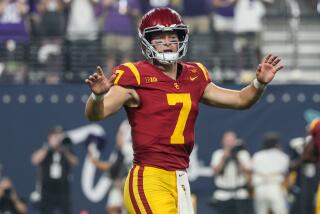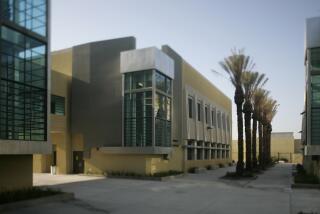Former USC lineman Armond Armstead sues school, others
Former USC football player Armond Armstead filed a lawsuit against the school and other defendants Thursday, claiming he received improperly administered painkilling injections that caused him to suffer a heart attack and hurt his chances for an NFL career.
The University Park Health Center and James Tibone, the Trojans’ team physician, and an unnamed pharmaceutical company also are named as defendants in a 38-page lawsuit that was filed in Los Angeles Superior Court.
The suit also claims that USC representatives concealed the injections from other physicians and also hindered Armstead’s attempt to transfer to another school for his senior season and to be drafted by an NFL team.
Damages sought are not specified, but Armstead’s attorney, Roger A. Dreyer, said in a phone interview that a high NFL draft pick could earn tens of millions over the course of a career.
“The issue is about accountability,” Dreyer said, “not how much it’s worth.”
USC declined to comment.
“It would be inappropriate at this time for USC to make a comment about the lawsuit,” the school said in a statement.
Armstead, a 6-foot-5, 298-pound defensive lineman, played for USC from 2008 to 2010. He sat out the 2011 season because the school would not clear him to play after he was briefly hospitalized in the spring. Neither Armstead nor USC officials would disclose his condition.
Armstead visited other schools to explore the possibility of playing his final season elsewhere. He decided to turn pro but was not selected in the NFL draft and was not signed as a free agent. He is playing for the Toronto Argonauts of the Canadian Football League.
The lawsuit says that in 2009 and 2010 Armstead improperly received injections of Toradol — a nonsteroidal anti-inflammatory drug also known as Ketorolac — and that “Defendants made it clear” to Armstead that “these injections were mandatory,” the suit says.
“This is not something where Armond said, ‘I want an injection,’” Dreyer said.
The suit says Armstead began experiencing chest pain in early 2011 during workouts in preparation for spring practice. He went to University Park Health Center three times and was given injections twice.
The suit says Armstead was not informed he was receiving Toradol or any NSAIDs or warned of the risks, “including the risk of heart attack or stroke.”
On March 3, the suit says, USC University Hospital determined that Armstead had suffered “an acute anterior apical myocardial infarction,” and that the administrations of drugs “were a substantial factor in causing the myocardial infarction.”
The suit says that USC representatives concealed the Toradol injections from other physicians and that when Armstead sought to play at another school, the defendants, “obstructed, prevented or otherwise refused to permit or cooperate in any such transfer.”
More to Read
Go beyond the scoreboard
Get the latest on L.A.'s teams in the daily Sports Report newsletter.
You may occasionally receive promotional content from the Los Angeles Times.











